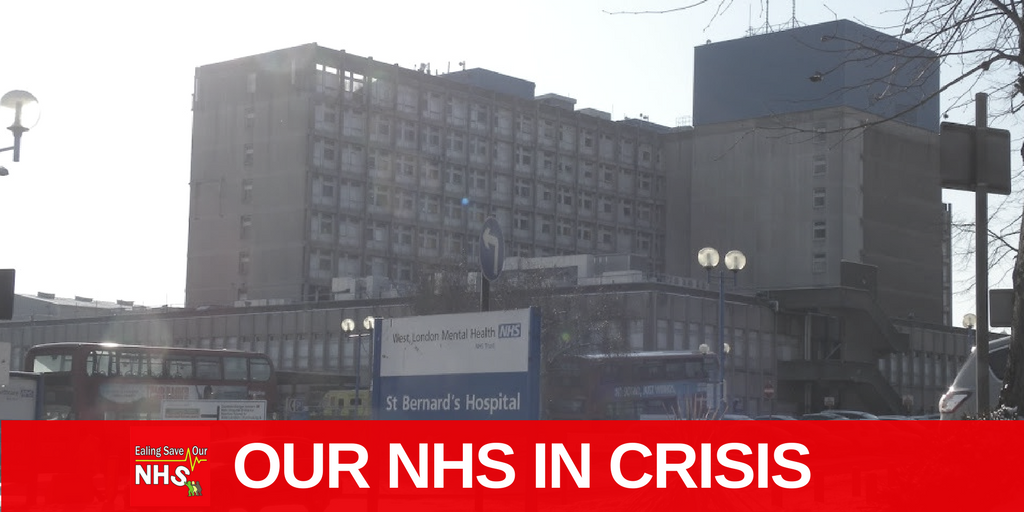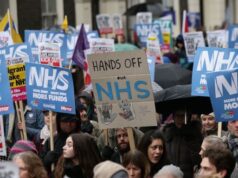Issue: 13
May 2014
This occasional newsletter is researched, written and edited by a group of concerned residents in Ealing, West London who want to preserve our NHS. We view the wholesale engagement of private, for-profit healthcare service suppliers as unnecessary, profligate and dangerous. Process improvement is what is needed in our NHS – not revolution.
Roche Adopts Ransom Aproach – Wanting £180,000 for Each Breast Cancer Patient Having a Few More Months To Live
The new ‘wonder’ breast cancer drug Kadcycla is still in use in the NHS, even though the National Institute for Health and Care Excellence (NICE) says it’s too expensive. Roche, the drug’s developer, seemingly wants to be paid £180,000 per patient treatment (assuming there is no ‘mark up’ by the NHS). Roche pleads that the cost of research, testing, trials, regulation (and no doubt litigation) is so cripplingly high that they have to charge this much. Poor old Roche only made profits of £7.7 billion last year.
The cash behind the drug’s continued use in England is provided by the NHS England’s Cancer Drugs Fund. So the NHS says yes to funding the use of Kadcycla in NHS hospitals in England and NICE (accountable to the Department of Health) says no. Joined up thinking, eh?
UK Now Has the ‘Least Hospital Beds in Europe’
Shocking figures have emerged from a recent Organisation for Economic Co-operation and Development (OECD) survey of 23 European countries. The UK has fewer than three hospital beds per 1,000 people, compared with over six in France and over eight in Germany. Eastern European countries now have more hospital beds than the UK.
Ealing Hospital currently offers 358 beds. In 2012 it had 327 beds. When Ealing Hospital is closed and demolished a new Urgent Care Centre ‘Plus’ will be built on the site offering just 30 beds, plus some beds moved from Clayponds Hospital in South Ealing (after it is closed and demolished).
GP Surgeries Opening at Weekends? With No More GPs and Nurses Available Surely This Will Just Degrade the Weekday Service?
There’s no sign that many more doctors and nurses are being trained or are signing up to work in GP surgeries. So the 1,147 GP surgeries that take the pieces of silver from the Government and open at weekends will have to work more days a week than they are doing now. Logically, that will degrade the weekday service, as they will almost certainly have a finite staff resource of trained GPs, nurses and administrative staff. If they attempt to operate for 6/7 days and in the evening, the existing staff will become tired, less effective and their error rate will no doubt increase.
There’s also lots of grandiose talk about communicating with patients on email and over Skype. This approach will not appeal to many of the 700,000 or so over 65 year old patients at the 7 day week GP surgeries. Skyping and emailing will of course reduce the quality face to face time GPs and Nurses actually spend with their patients.
Royal College of Physicians’ President Warns Care of Patients is Under Threat
Sir Richard Thompson presides over a well established and respected organisation which represents most of the UK’s 30,000 doctors (except in Scotland). He told ‘The Guardian’ last month that care of patients was under threat because of absolutely destructive case loads. During their shifts acute medicine doctors are regularly facing case loads of more than the recommended maximum of 20. Some, frighteningly, have case loads of up to 70 patients in a single shift. He claimed that ‘the NHS is under-doctored, under-nursed, under-bedded and under-funded’. Dr Mark Porter, the leader of the British Medical Association, immediately endorsed Richard Thompson’s claims.
Surely this is a train crash just waiting to happen.
As We All Suspected – NHS Patient Records Have Been Released to Astra Zeneca, Baxter, Bayer, Bupa, Roche, BMI, McKinsey & Co, PwC, Care UK, Ernst & Young and others
On 3 April 2014 in response to concerns about transparency, the Health and Social Care Centre (HSCIC), a Department of Health body, published data which showed that medical record information had been released on more than 450 occasions to recipients including 56 private sector organisations. Identifiable data has been released on 75 occasions. Critics have pointed out that HSCIC is deliberately concealing releases of data that might cause itself, Ministers or other officials embarrassment or political damage. No details at all have been released concerning Police access to personal medical records.
HSCIS has existed in one form or another since 2005. It stores, analyses (and releases) data on hospital activity in the NHS in England. It also supplies NHS IT systems for health and social care.
www.ealingclinic.com – England’s First Mental Health eClinic
Ealing Council, the ECCG and The TASHA Foundation trumpeted the launch of this ground-breaking digital ‘walk-in’ mental health clinic in ‘Ealing Gazette’ on 4 April 2014. Sadly on 7, 8, 13,19, 21, 26 and 28 April 2014 the web site was ‘Server not found’.
Not an auspicious start for what might become a useful online help facility.
Capita Failing to Clear Medical Assessment Backlogs for PIPs for Terminally Ill, Sick and Disabled
The Personal Independence Payment (PIP) was introduced in April 2013 to replace Disability Living Allowance (DLA). PIP is already in a mess. According to the Department of Work and Pensions (DWP) fewer than one in six who have applied for PIP have had their claims decided. Two out of three people who apply for PIP are receiving nothing at all. In February 2014 DWP revealed that 220,300 people had made claims for PIP in the nine months since its inception. Of these only 12,654 have been awarded the benefit.
Capita, ‘a UK leader in business process management and outsourcing solutions’, was awarded the contract to assess PIP claimants in 2013. By February 2014 the National Audit Office had sized the Capita assessment backlog at 92,000 claimants. If Capita is the UK leader in outsourcing one dreads to think what the laggard outsourcers are like……
DWP civil servants have had to abandon their jobs and step in in an attempt to help Capita in its struggle to clear the backlog.
PIP is worth between £21 and £134 per week. Assessment for PIP is made using a points based system. Points are awarded on ‘descriptors’ on a range of activities related to someone’s daily living needs and mobility. Like the other key disability benefits, Employment Support Allowance (ESA) and the controversial Work Capability Assessment (WCA), PIP’s point-based assessments result in poor decision making and widespread appeals. Even the Government’s own figures predict the 600,000 people with disabilities will lose their entitlement to support under the new criteria.
And at www.spartacusnetwork.org.uk ‘Beyond Repair’ research on ESA was published last month. Successful appeals against assessments are at an all time high of 43%. Just 5% of those referred to the Jobcentre Plus Work Programme have found sustained work.
Surely another inevitable disaster is in prospect here.
Understaffed, Overworked and Underfunded NHS Hospitals Urged to sell Skills Abroad
To add insult to injury English NHS hospitals – many stretched to breaking point with rising demand and depleted budgets – are being officially urged to sell their skills abroad. This brainwave comes from Healthcare UK. Healthcare UK supports the sale of UK public and private healthcare services abroad and the import of any healthcare services. It is a joint initiative of the Department of Health, UK Trade and Investment and NHS England.
Instead of NHS funds being raised by conventional taxation, attempts are being made to persuade NHS hospitals to take on commercial contracts abroad, mainly to provide staff training in places such as China, India and Russia. And foreign nationals in the UK are also fair game for paid treatment by English NHS hospitals according to Healthcare UK.
EALING CLINICAL COMMISSIONING GROUP (ECCG)
A group of us spent an hour on 2 April 2014 with Dr Mohini Parmar and Kathryn Magson – Chair and MD respectively of the ECCG. After maybe a year in their Greenford offices ECCG will soon move to occupy a floor in the London Borough of Ealing (LBE) office block Perceval House just next to Ealing Town Hall. The ECCG employs over 80 people and it is supported by the NHS NW London Commissioning Support Group (CSU) with 432 staff. The CSU supports eight CCGs in total.
I pursued my research in trying to understand just how Ealing GPs will deliver mental health primary care. Of course one of the challenges for CCGs is that they have no statutory control over GPs. ECCG has so far managed to persuade (by offering them money) fewer than half of the 79 Ealing GP practices to provide mental health primary care. The mantra seems to be that these 35 practices will only care for the small number of patients in their catchment area with long term but stable conditions. I asked about ECCG commissioning mental health carer support and was directed to the £24 million Better Care Fund (BCF) and asked to contact Andy Roper of the Ealing Community Network. After studying BCF documents I am still no wiser.
The Better Care Fund (BCF) is apparently a £3.8 billion ‘single pooled budget’ to be spent to ensure a transformation in integrated health and social care. Announced in June 2013 its aim is for health and social care services to work more closely together. Organisationally, fiscally and from an accountability perspective this will all be very tricky. CCGs commission hospital/secondary care services. NHS England commissions GPs. Local authorities commission local social care, and health and wellbeing services. CCGs and GPs now appear to be delivering mental health services. In Ealing the BCF is a partnership between ECCG, LBE and the Ealing Health and Wellbeing Board.
We tried to get a handle on what healthcare services the new expanded Urgent Care Centre to be built on the site of the demolished Ealing Hospital will offer. A long discussion ensued about hospital beds. 102 hospital beds will exist and these include those at Meadow House hospice which is thankfully not being demolished. In 2012 Ealing Hospital operated 327 hospital beds.
ECCG did not deny that the birth unit at Ealing Hospital will close by February 2015. Two years ago a brand new birth unit was opened at Ealing Hospital. 2,915 babies were born in Ealing Hospital’s Maternity Department last year. ECCG pooh-poohed home births as just 0.2 % of all births. They seemed very relaxed about Ealing ladies in labour travelling to Harrow, Hillingdon, Hounslow and Hammersmith.
We asked ECCG to explain ‘Co-commissioning’. They were somewhat unsure themselves but they felt it was all about economies of scale, and like minded professionals getting together to bid for service delivery contracts.
ECCG along with the other seven NHS NW London CCGs are attempting to work as one by pooling some of their money over five years. This is currently illegal. However the ever optimistic Daniel Elkeles (Chief Officer of the five CCG ‘federation’ CWHHE) thinks new legislation will arrive in October 2014 to allow this. If this goes ahead £57 million will be available over the next 12 months across 2 million patients to implement the great English NHS healthcare experiment that is ‘Shaping a Healthier Future’ across north west London. £35 million will be available for the eight ‘super-federated’ NHS NW London CCGs to (incredibly) ‘ensure a more level playing field between CCGs’. £47 million will ostensibly be available to ‘improve’ (create?) Out of Hospital services ‘such as seven day opening and community services’. So much for a locally GP driven Clinical Commissioning Group in Ealing deciding and directing how 60% of our National Insurance payments are spent here.
And yet again Greenford GP Dr Parmar was a ‘no show’ at another public event. On 8 April 2014 the Seniors Action Group Ealing (SAGE) gathered some 60 elderly people in Ealing Town Hall to hear Dr Parmar speak about the proposed changes to health services in Ealing. She failed to appear, but said she had arranged for ECCG Vice Chair Dr Raj Chandok to speak in her place. When SAGE contacted him he said that he’d forgotten about the meeting. A sense of déjà vu here as Dr Parmar failed to show up at the equivalent SAGE meeting on 11 September 2013 and at public events in 2012 on 26 September and 11 October. Maybe SAGE should send her a bill for ‘non-attendance’.
WEST LONDON MENTAL HEALTH TRUST (WLMHT)
Every now and then I come across a real hero manager in the NHS. On 8 April 2014 I (along with 20 other mental health volunteer carers) spent 2.5 hours with Jeremy Mulcaire, Sector Manager, WLMHT. He runs Avenue House in Acton, which houses Recovery East Team. There are two Recovery teams to cater for the whole of Ealing – Recovery Team East and Recovery Team West (based at The Limes, Southall), plus a single Assessment Team (at Cherrington House in Hanwell) and a single Cognitive Impairment and Dementia Team
The headlines of his job are too few staff trying to help too many patients (‘service users’). There are 2,000 registered service users. To service them he has 8 Social Workers (case loads of 25 – 35 patients!), 6 Psychiatrists, 2 Occupational Therapists, 4 Psychologists and 13 Community Psychiatric Nurses (CPNs) – full and part-time. A recent (and useful) innovation is that the Community Forensic Service has installed one of its CPNs at Acton Police Station – now the solitary Police Station across Ealing’s 21 square miles which is open all hours. The incidence of mental health problems is rising. WLMHT budgets are falling. The number of staff on the WLMHT payroll has dropped by 500 over the last two years. WLMHT disputes this arithmetic and says ‘(we) have achieved reductions in posts by not filling vacant job roles and where people have left the trust or retired we have evaluated posts and reduced numbers where possible….’. WLHMT is also claiming that it is now ‘treating more patients in the community, with more mental health primary care workers who work alongside GP’s…’. Next month I’ll try to find out just how many of these workers are in place in Ealing and just how effective this ‘changing settings of care’ approach is.
Avenue House serves a population of 170,000 residents, of whom 125,000 are adults. MIND and others assess that 9% of the population in England suffer from the most common mental illness – anxiety and depression – to meet the criteria for diagnosis. So for Avenue East just for this one mental health condition and just dealing with adults there are 11,250 people in need. If one then adds up the % of the population with Phobias, Schizophrenia, Obsessive Compulsive Disorder, Post Traumatic Stress Disorder, Eating Disorders, Bipolar Disorder, and Personality Disorders we get to 17.7%.To be fair some patients present with or are diagnosed as having multiple disorders. So if we cut this to 5%, that’s another 6,250 adults in need. In total 17,500 sufferers in need.
Clearly not all those in need are seriously ill, self harming or a danger to other people. But with ever diminishing financial and professional resources within the WLMHT service, Jeremy and his peers have to be very hard working and creative with resource utilisation. He makes use of trainee Social Workers and medical students. The fact that Jeremy spent one of his week day evenings talking to carers shows he appreciates how with more information and training carers can make a huge difference to their loved ones’ quality of life and to the overall mental health community care service in Ealing.
The evening’s presentation was organised by the excellent Carers Support Group, which meets every second Tuesday in the month at Avenue House, Acton. The volunteer Carer Supporter who runs this is Paulette Ranaraja, Sadly the group’s grant funding from the London Borough of Ealing ran out on 31 March 2014. Lobbying WLMHT and the ECCG for some financial support has yet to bear fruit. More on this hopefully next month.
And more news on the demise of mental health care facilities at St Bernard’s Hospital in Southall. 270 new mixed tenure homes are to be built on 5.6 acres of the St Bernard’s site. Catalyst Housing, part of the G15 Group, beat private house builder Bellway to the deal. Catalyst paid £24 million for the land and plans to spend £65 million developing the site beginning in Autumn 2014. WLMHT is of course going to build a new medium secure mental health unit on the St Bernard’s site.
85% of Older People With Depression Get No Help from NHS
Last month the Royal College of Psychiatrists (RCP) estimated that two thirds of elderly people with a mental health problem have a condition other than Dementia. Bereavement, loneliness and loss of physical independence can all trigger depression says the RCP – but depression is a treatable condition. The RCP points out that as well as a general lack of awareness of the size of the depression problem amongst the elderly, there is a severe lack of treatment resource throughout the NHS.
The NHS Confederation reports that NHS investment in mental health services dropped in real terms by 1% and 3.1% for older people in 2011/2012 (the most recent figures available).
Teachers Report Rise in Mental Health Fears
A recent poll of members of the Association of Teachers and Lecturers (ATL) reveals that 38% of school and college staff have seen a rise in mental health issues amongst colleagues in the past two years. 80% admitted they were stressed. 70% said they were left feeling exhausted by their work. Worryingly, 68% of those dealing with a mental health problem had decided to keep it secret from bosses, compared with 38% who kept a physical health issue to themselves.
The Department of Education’s (DoEs) response to the ATL findings was that statistics show that teaching had never been more ‘attractive, more popular or more rewarding’ – so no mental health issues over at the DoE then…….
NHS Bosses ‘Gifted’ Huge Pay Rises and Immoral Redundancy Payments
Just by staying alive, NHS Directors John Holden, Richard Murray, Ben Dyson and Miles Ayling had their salaries raised by at least £30,000/year to at least £115,000/year. 3,950 NHS managers have received redundancy payments only to return to other NHS positions. 330 of them were each given over £200,000. Surely someone should go to gaol for this robbery.
Lord Norman Warner Wants Us All to Pay £120 Each Year So that We Can Continue to Enjoy Our Free Universal Healthcare System
Norman Warner, a former Labour Government Health Minister, may have dozed off when his school History teacher waxed lyrical about Pitt the Younger introducing Income Tax in 1798 and about the National Insurance Act of 1911. He wants to introduce a new form of taxation paid to Local Authorities in order to increase NHS funding. Given we have a well established taxation system either increase people’s contribution to fund the NHS or stop funding other initiatives and use the saved money on the NHS.
NHS Employs 826 Public Relations Staff at a Cost of £34 million Each Year
The Tax Payers Alliance has revealed scandalous PR staff numbers at the NHS. I have to say that given there are 826 PR folks at the NHS and given its reputation is at an all time low, there’s not much value for money in the £34 million per year being spent. That of course is assuming that all these PR people are being paid to try and generate good news and not bad news…..
Guys and St Thomas’ NHS Foundation Trust employs an incredible 22 PR staff at an annual cost of £1.1 million. West and South Yorkshire and Bassetlaw Commissioning Support Unit employs an eye watering 36 PR people at an annual cost of over £1.4 million.
Maidstone and Tunbridge Wells NHS Trust: Famous For All the Wrong Reasons
2013
February: Novovirus closed hospital wards
February: Trust Faced £3.5 million C.difficile fine
August: Agency nurse paid £1,500 for 11 hour shift – a UK record
October: £400,000 damages over ectopic pregnancy death
November: Director of Finance resigns
2014
March: Deaths of five cancer patients halts surgery
March: Fined £1.5 million again for failing to control the incidence of C. difficile




